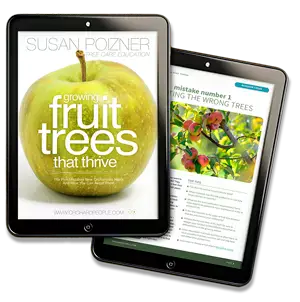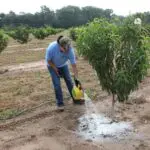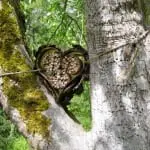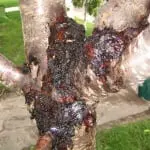Learn how beneficial nematodes can help you protect your fruit trees from plum curculio and other pests.
Holistic Sprays for Fruit Trees

What Are Holistic Fruit Tree Sprays?
If you’re growing fruit trees organically and you want to improve your trees' health and resistance to fruit tree pests and diseases, you may consider using holistic sprays for fruit trees. This is a technique made famous by the late author and orchardist Michael Phillips of Lost Nation Orchard in New Hampshire.
In 2015, I explored the topic in a webinar interview with Michael, the author of The Holistic Orchard and The Apple Grower. Michael didn't use toxic conventional fungicides and pesticides on his trees. Instead, he used holistic sprays to support his trees nutritionally and biologically.
What Do Holistic Sprays Do?

For trees to be healthy and able to fight off pests and diseases, they need access to key nutrients like trace minerals and nitrogen. Holistic sprays support the microbial populations on the plant surface.
Phillips' “Core Holistic Spray Recipe,” is a foliar spray that is applied to tree leaves and branches.
The foliar spray mix includes:
- Liquid fish, a fertilizer which is packed with nutrients
- Neem oil, which is said to be a pest repellent but is also high in nutrients
- Blackstrap molasses, which helps activate beneficial microorganisms on the leaf surface
- Mother culture of effective microbes, a liquid bacterial product that contains microbes that will enhance plant health
Fruit Trees
That Thrive

When Should You Apply Holistic Sprays to Your Fruit Trees?
Michael Phillips' holistic spray (recipe below) is designed to be used in the spring. But timing is key:
- First application: early green growth. Spray the trunk and branches of the tree on a warm day in early spring, when the buds have “popped” and green tissue starts to show.
- Second application: just before blossoms are revealed. At this point, pink blossom buds are revealed just prior to the blossoms actually opening.
- Third application: after petal fall. Drench your tree, its leaves, and baby fruitlets with the spray just after petal fall, until the point of runoff.
- Fourth application: 7 to 10 days after petal fall. Again, drench your tree, its leaves, and baby fruitlets with this solution.
Michael Phillips's Core Holistic Fruit Tree Spray Recipe
(Creates enough to spray a backyard orchard.)
NOTE: To ensure that the neem oil emulsifies properly, add it to the sprayer last.
In a 4-gallon sprayer, mix:
- 1 teaspoon of soap emulsifier (dishwashing liquid like "Seventh Generation," "Ecover," or "Dr. Bronner's"
- Just under 4 gallons of water (leaving room for the additional ingredients below)
Then add..
- 10 ounces of liquid fish
- 6 ounces of mother culture of effective microbes (from TeraGanix: http://www.teraganix.com/ or SCD Probiotics: http://www.scdprobiotics.com/)
- ½ cup of blackstrap molasses mixed with ½ cup of warm water
- 2.5 ounces of pure neem oil
Shake your sprayer to mix this together. Spray on your trees until it is used up. When you reapply, you’ll need to mix another batch.

Other ways to protect fruit trees
Holistic sprays are just one tool in your toolbox when it comes to protecting fruit trees. Another complimentary approach is to use pest reduction traps and lures.
You an also plant native plants in order to attract attract beneficial insects to your garden. Beneficial insects include native bees and other insects that eat or parasitize insect pests. Attracting certain types of birds to your garden can also help.
All these approaches are part of Integrated Pest Management, an approach that organic and conventional growers around the world use to minimize the use of chemical sprays and to protect their fruit trees in an economical way.
Learn more about Integrated Pest Management in my online course for home growers, arborists and gardeners.
Recommended Reading on Holistic Sprays (affiliate Links)
Michael Phillips books are excellent, but may be hard reading for a new grower. In my book Grow Fruit Trees Fast I include a chapter on fruit trees and soil and I cover holistic sprays in depth.

Susan Poizner
Learn more about Susan on the about us page.



